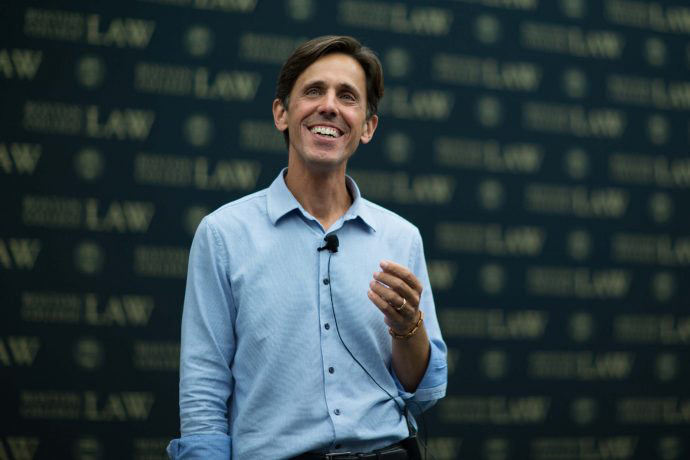As part of his state of the school address that concluded a week of remote Reunion 2020 activities, Dean Vincent Rougeau spoke November 19 of the Law School’s efforts to create a more inclusive and diverse culture. Those efforts, he said, include the recent hiring of BC Law’s first Director of Diversity, Equity, and Inclusion and the current search for a senior-level faculty member whose scholarly interests focus on racial justice.
Rougeau’s comments on healing divisions in the United States foreshadowed what was to come in the keynote address delivered by David Simas ’95, who was a valued advisor to President Barack Obama on the campaign trail and in the White House. In 2016, Simas was appointed CEO of the Obama Foundation, where he has since worked alongside the former president to empower and connect new generations of civic leaders.
Simas said that with all that has occurred in the country’s history regarding racial and political divisions, the thought of everyone getting along is naïve. So, rather than dwelling on unrealistic goals, he suggested that citizens ask the following question: “How can we turn down the temperature and engage with each other, not as enemies or even opponents, but as Americans who disagree on some issues, but overwhelmingly agree on most of the issues that face us as a nation?”
He also acknowledged that that in itself is a heavy lift.
For one thing, despite record turnout in this year’s election, a large number of eligible voters chose to disengage and tune out by not casting a ballot. “Let’s just acknowledge that one third of Americans said, ‘No matter what they’re selling, I’m not buying it. Period.’,” Simas noted.
For another, over the past half century, public trust has eroded. Simas alluded to a social science survey posed to American citizens for the past 50 years, the question being: Do you, in general, trust your neighbor to do the right thing? In the 1970s nearly 60 percent of Americans answered yes. When that measure was taken just a couple of years ago, the results were drastically different. More than 70 percent answered no.
“We are living through many pandemics, but there is a pandemic of cynicism and a collapse of social cohesion and social capital that needs to be understood in order to contextualize our politics,” Simas said.
He added that in order to understand the intensity of the moment, one has to look at the coalitions that are forming increasingly around region, religiosity, and race. This phenomenon “turns politics not into a debate about issues, but essentially [into] a tribal dynamic of my people versus your people, people like me against people like you,” Simas said.
The result is a continuous and perpetual election mode where the main area of concern is gaining an advantage for one’s party. “It doesn’t really yield too much time for governing,” Simas observed.
Think of the valuable resources such as time, money, and energy that are being spent on trashing the opposing party instead of improving the nation. “Three-and-a-half billion dollars were just spent in a matter of a year, including $600 million in the final four weeks on television in seven states, 90 percent of which was negative,” Simas said. “There is an entire industry that’s built around this constant conflict.”
Although the current health crisis and racial and political divisions have created an unprecedented era of angst and uncertainty, Simas does see opportunity for unity.
“The common enemy for Democrats, Republicans, and Independents is not each other,” Simas said. “Covid and this dark winter that we are going into essentially is the common enemy. There are hundreds of thousands of Americans who are dying; the economy is shut down and closed; we need to fix this first. That is where I think there is an opening for unity.”
Simas believes Americans are looking at a multi-year, decades-long, institutional reform period. The period that will require a fundamental rethink of the way democracy works in the United States, specifically, the way elections are structured and the way we govern and engage with one another.
“I can think of no one better than people who have gone through Boston College Law School—with the ethos and the values that it has—to be part of that solution,” Simas said.
He went on to suggest that at the heart of any realistic solution to current problems is civic leadership. “Our North Star is all around civic leadership,” Simas argued. To hammer home his point, he quoted former Massachusetts Governor Deval Patrick, for whom he once worked, in saying, “You can lead in one of two ways: by having people turn to each other or by having people turn on each other.”
Simas’s final call to action was directed at the Boston College Law School community, which, in his eyes, has a special responsibility. He proposed that in argument, consensus, and reason, “we can demonize the idea, but never, ever the person.”
Simas Reunion speech on YouTube.


